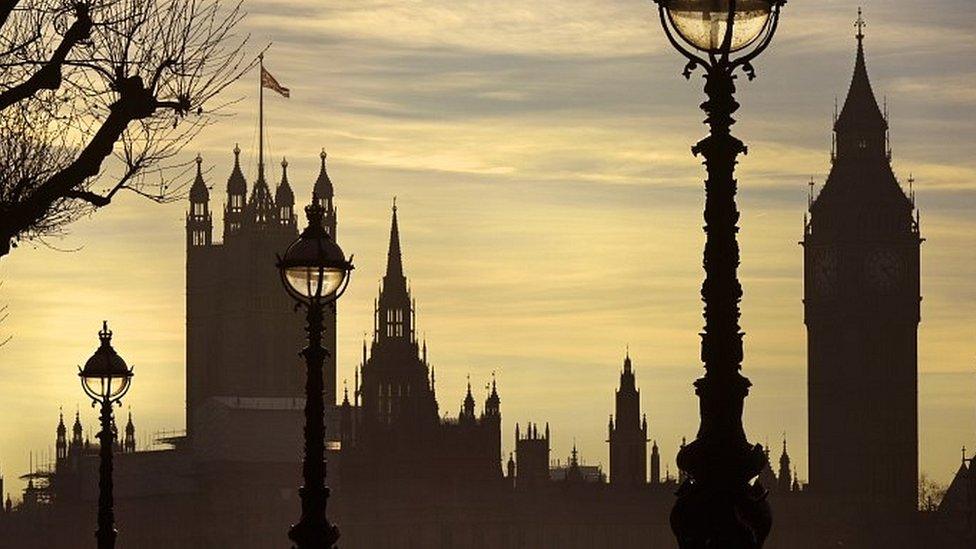What's happening in Parliament next week?
- Published

As Parliament laboriously gnaws its way through the remainder of the current political agenda, attempting to complete consideration of the current set of proposed new laws, MPs will also get their first glimpse of the next set of political issues.
Between updates on Ukraine, and resolving the outstanding issues in the Police, Crime, Sentencing and Courts Bill, the Health and Care Bill and the rest, the chancellor's spring statement lifts the curtain on all manner of new issues.
What had at one point looked like quite a low-key event may now be white-hot with controversy, thanks to the gathering cost-of-living crisis and the impact of the Russian invasion of Ukraine.
Rishi Sunak will be under huge pressure to cut VAT on energy, postpone or cancel the planned National Insurance rise, and simultaneously find the resources for a major increase in defence spending, not to mention post-pandemic spending demands like health and education catch-up programmes, all while meeting higher interest payments on public debt.
It will be fascinating to watch the chancellor, and the reactions to him, as he attempts to steer through the conflicting demands from every quarter, all while promising sustainable tax cuts.
Ping-pong problems
Meanwhile, the law-making machine continues to whirr away, with amendments to major legislation like the Police, Crime, Sentencing and Courts Bill, bouncing between the Lords and the Commons, and private members' bills on all issues ranging from the recognition of British Sign Language to the banning of glue traps whizzing rapidly through the Lords, and into law.
With "parliamentary ping-pong" - the process of finalising a new law, when the Lords and Commons don't agree on its exact wording - a prominent feature of the coming weeks, many MPs feel the Lords has been pushing its luck.
Remember, to become law, a bill must be agreed in identical form by the Commons and the Lords. So far the government has lost 89 votes in this parliamentary year, with the potential for Noble Lords to reach their century before close of play, probably at the end of April.
Nineteen defeats have been suffered on the Nationality and Borders Bill stand alongside 10 on the Health and Care Bill, 19 on the Police Bill and 14 on the Environment Bill - and that's just the biggest bills on offer.
When to push back?
Some argue that this looks like over-reach and that peers should be more cautious about comprehensively rewriting government legislation, because it makes the Commons more likely to dismiss their amendments out of hand.
The decision facing peers will be how often they will push back if their amendments are rejected. Do they bow their heads and accept the will of the elected House, or do they maintain their defiance and send back a new version of their amendment?
On some key issues on human rights and constitutional propriety they may feel more empowered to do that than they would on humdrum points of legislative detail.
One measure to watch is the Elections Bill, where a lot of peers are very unhappy with the government's proposals, and where noble heels may be dug in for a period of protracted deadlock.
Welcome party
But it's also worth asking why the Conservatives, easily the biggest single bloc in the Upper House, are losing so routinely. A major reason is that many Tory peers are simply not turning out - or are not staying the course for late night divisions, where the government has lost by a handful of votes in the small hours.
And many of the recently created peers seem to regard their honour as a reward, rather than a role. So after a party to celebrate their ennoblement, some of them are never seen again, much to the chagrin of their whips.
All of which leaves the government struggling to get its legislation through unscathed, and having to devote a lot of Commons time and some political capital to reversing its Lords defeats. And short of major Lords reform (which would take an impossibly large amount of parliamentary time for an issue voters don't care about), there's no obvious fix.
Picking up the cost-of-living theme, committee action includes a session of Business, Energy and Industrial Strategy for its inquiry into energy pricing and the future of the energy market, while Work and Pensions looks at saving for later life.
